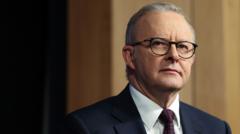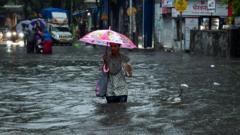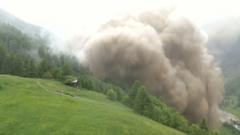Amid devastating weather events and significant political challenges, the road to re-election for Albanese and the Labor Party is fraught with uncertainty. The recent cyclone has not only delayed political announcements but has also overshadowed key issues like climate change, the economy, and Indigenous rights. As the political landscape tightens with rising support for the opposition and minor parties, the implications for the future government structure in Australia remain unpredictable.
Challenges Loom Over Albanese's Election Bid as Cyclone Disrupts Plans

Challenges Loom Over Albanese's Election Bid as Cyclone Disrupts Plans
As the Australian election approaches, Prime Minister Anthony Albanese faces significant hurdles with rising discontent among voters.
With the Australian elections just around the corner, Prime Minister Anthony Albanese has encountered problematic developments that threaten his re-election campaign. Cyclone Alfred's impact this month forced Albanese to pivot from promoting his electoral agenda, which includes tackling climate change and cost-of-living issues, to addressing the immediate needs brought on by the natural disaster. This is a continuation of his term's challenges, where unexpected events dictate political narratives — from global economic turmoil to local disasters exacerbated by climate issues. Meanwhile, opposition leader Peter Dutton of the Liberal Party stands as the primary challenger, with polls indicating a tightening race following Albanese's significant but ultimately undone win in May 2022.
Albanese's ambitious agenda, particularly regarding Indigenous affairs, saw a major setback when a referendum on an Indigenous Voice to Parliament was soundly rejected by over 60% of voters. The fallout of the failed campaign has left many Indigenous Australians feeling let down, while Dutton has effectively capitalized on the dissatisfaction by positioning Labor as disconnected from pressing voter concerns during a time of rising inflation and economic strain. In the backdrop of this tension is a growing trend of disillusionment among voters toward traditional parties, making way for increased support for independents and minor parties — a development that could lead to a hung parliament if neither main party secures a clear majority. Experts attribute some stability in Australian politics to mandatory voting, which encourages broad participation, and to preferential voting, which requires candidates to appeal beyond their base.
Yet, current political climate continues to draw parallels with global tensions, particularly regarding international leaders like Donald Trump, whose actions have ignited concerns among Australians about global relations and security. As the campaign intensifies, Albanese's approval ratings might improve, but he still confronts the possibility of leading the first government in over 90 years to fail in securing a second term. The outcome remains uncertain, setting the stage for heightened political engagement in the weeks leading up to the May 3 election.
Albanese's ambitious agenda, particularly regarding Indigenous affairs, saw a major setback when a referendum on an Indigenous Voice to Parliament was soundly rejected by over 60% of voters. The fallout of the failed campaign has left many Indigenous Australians feeling let down, while Dutton has effectively capitalized on the dissatisfaction by positioning Labor as disconnected from pressing voter concerns during a time of rising inflation and economic strain. In the backdrop of this tension is a growing trend of disillusionment among voters toward traditional parties, making way for increased support for independents and minor parties — a development that could lead to a hung parliament if neither main party secures a clear majority. Experts attribute some stability in Australian politics to mandatory voting, which encourages broad participation, and to preferential voting, which requires candidates to appeal beyond their base.
Yet, current political climate continues to draw parallels with global tensions, particularly regarding international leaders like Donald Trump, whose actions have ignited concerns among Australians about global relations and security. As the campaign intensifies, Albanese's approval ratings might improve, but he still confronts the possibility of leading the first government in over 90 years to fail in securing a second term. The outcome remains uncertain, setting the stage for heightened political engagement in the weeks leading up to the May 3 election.





















